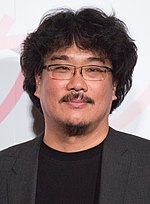Parasite (2019 film)
It was released in South Korea by CJ Entertainment on 30 May, and was praised for Bong's direction and screenplay, and also for its editing, production design, and the performances of the cast.
Leaving to study abroad, he suggests that Ki-woo lie about his qualifications to take over Min-hyuk's job as an English tutor for Da-hye, the daughter of the wealthy but naïve Park family.
After Ki-jung helps forge a certificate for him, Ki-woo, posing as a Yonsei University student named "Kevin", is hired by the Parks.
Ki-woo recommends "Jessica," actually Ki-jung, as an art therapist for the Parks' young son, Da-song, who has been traumatised after seeing a "ghost" in their kitchen.
Ki-jung then frames Yoon, the Parks' chauffeur, by making it appear as though he had a sexual encounter in the car, leading to Ki-taek being hired as his replacement.
There, Moon-gwang's husband, Geun-sae, has been hiding from loan sharks and is revealed to be the "ghost" Da-song saw when he was trying to leave the bunker to steal food.
Moon-gwang begs Chung-sook to allow Geun-sae to continue living there in exchange for regular payments, but the three other Kims, who are eavesdropping, accidentally reveal their true identities.
The Kims manage to escape, but the torrential rain floods their flat with sewage water, forcing them to take shelter in a gymnasium alongside other displaced people.
Still living in their flat with his mother, Ki-woo writes a letter to Ki-taek, vowing to earn enough money one day to buy the house and free him.
[18] Bong further referenced the design of the wealthy protagonist's house in Kurosawa's 1963 film High and Low as an important visual influence, as was the incident of Christine and Léa Papin to the story—an event wherein two live-in maids murdered their employers in 1930s France.
[32] It was designed and constructed to be not only beautiful but "a stage that served the precise needs of his camera, compositions, and characters, while embodying his film's rich themes".
"[34] For example, Ha-jun established that Namgoong would have used the first floor's living room to appreciate the garden, so it was built with a single wide window and only spartan seating options for this function.
[32] The team designed the home and interiors to make the set amenable for filming at the 2.35:1 aspect ratio, favouring wide and deep rooms rather than height.
[34] Lee Ha-jun visited and photographed several abandoned villages and towns in South Korea scheduled to be torn down to help inform the set design.
[38][39] The score, by South Korean composer Jung Jae-il, consisted of "minimalist piano pieces, punctuated with light percussion", setting the film's "tense atmosphere".
A glass of soju), written by Bong and performed by Choi Woo-shik, who plays Ki-woo, is heard during the film's end credits.
This term came about due to high rates of youth unemployment, the intense demands of pursuing higher education, the crisis of home affordability, and the increasing socioeconomic gap between the wealthy and poor.
[55][56][57] In Coronavirus Capitalism Goes to the Cinema, Nulman writes that the word "parasite" originally referred to a "person who eats at the table of another", which occurs in one scene of the film.
[52] Bong has referred to Parasite as an upstairs/downstairs or "stairway movie",[20] in which staircases are used as a motif to represent the positions of the families in the homes of the Kims and the Parks, as well as the basement bunker.
[59] The Kims' semi-basement apartment is typical for poorer Seoul residents due to its lower rent, despite having issues such as mold and increased risk of disease.
[52] Others said Parasite revealed the misfortunes of poor, powerless victims of an indifferent world who are transformed into liberation through the comical effect of mass slaughter.
The website's critics consensus reads: "An urgent, brilliantly layered look at timely social themes, Parasite finds writer-director Bong Joon Ho in near-total command of his craft.
[120] Bilge Ebiri of Vulture magazine wrote that Parasite is "a work that is itself in a state of constant, agitated transformation—a nerve-racking masterpiece whose spell lingers long after its haunting final image".
[121] In his five-star review, Dave Calhoun of Time Out praised the film's social commentary, calling the work "surprising and fully gripping from beginning to end, full of big bangs and small wonders".
[125] UK film website TheShiznit awarded it an A, noting "it makes you wonder what the inflection point for such behaviour is in a culture where manners and servitude are drilled into those who can't afford not to have them".
[135][136] Parasite was submitted as the South Korean entry for Best International Feature Film for the 92nd Academy Awards, making the December shortlist.
"[153] A six-hour HBO limited series based on the film, with Bong and Adam McKay as executive producers, was announced to be in early development in January 2020.
[160][161][162] Criticism has been made about the commercialisation of areas known for poverty in South Korea as tourist destinations without concrete steps being taken to address the issues.
The Justice Party claims that it became famous due to the universal recognition of global inequality,[165] but sees the development of a tourist attraction based on the film in Seoul as further exploitation of poverty.
[166] Residents of Parasite's filming locations have reportedly complained of a sense of embarrassment and discomfort due to an increase in tourists visiting their neighbourhoods and taking photos of their surroundings, making them feel like "monkeys in a zoo".




